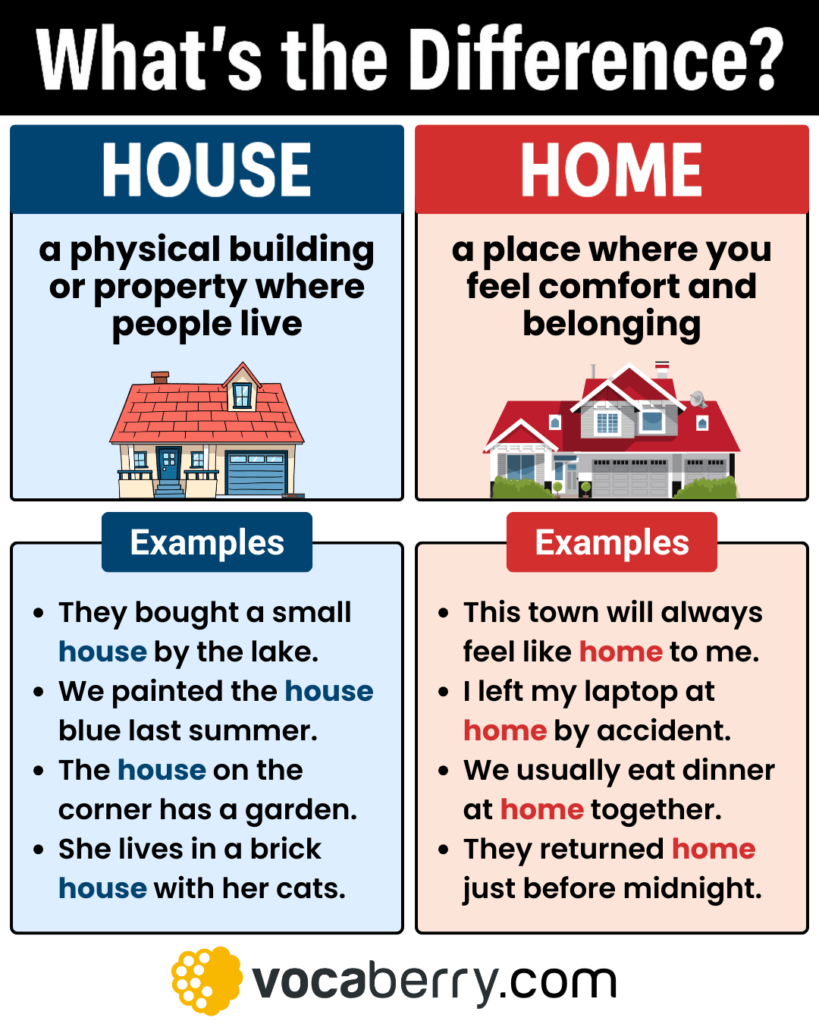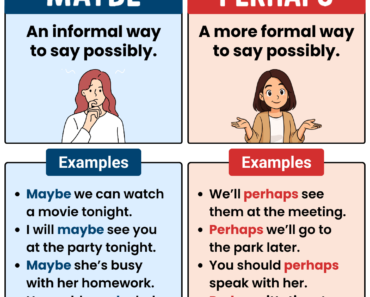
House and home both refer to places where people live, but they aren’t the same. A house is a physical building with walls, a roof, and doors, while a home is the feeling of comfort and belonging you associate with the place where you live. One is structure; the other is meaning.
In this article, you’ll learn the difference between house and home, with clear definitions, grammar explanations, and examples to help you use each word correctly in English.
What Does “House” Mean?
House is a noun for a physical building where people live. It is countable (a house, two houses) and common in real estate and architectural contexts. Use house when you focus on the property or structure, not on feelings. You’ll also see it in compounds such as household, housework, and greenhouse.
Examples:
- They bought a house near the beach last year.
- The house has five bedrooms and a sunny patio.
- The house next door is for sale again.
What Does “Home” Mean?
Home is mainly a noun meaning a place of comfort, safety, and belonging. It isn’t limited to a house and can be an apartment, a room, a town, or a country. Home also functions as an adverb of place after motion verbs, so it takes no ‘to’ (go home, come home, arrive home). Rarely, it’s a verb in technical phrases like home in on.
Examples:
- It feels good to be home after work.
- I left my keys at home this morning.
- This city is my home now, not just a place.
Example Sentences Using House and Home
Here are 10 sentence examples for each word to help you use them in context.
Example Sentences with House:
- They bought a large house in the countryside.
- The house on the corner has a beautiful garden.
- We plan to sell our house and move closer to town.
- This old house has a lot of character and history.
- I forgot my phone at his house yesterday.
- The house was completely empty when we arrived.
- They’re building a new house next to the school.
- She lives in a small house with her two cats.
- We painted the house blue last summer.
- The house shook during the earthquake.
Example Sentences with Home:
- After months abroad, it felt amazing to be home again.
- This place may be small, but it’s my home.
- He finally found a place that felt like home.
- I usually have dinner at home with my family.
- She invited us to her home for the holidays.
- No matter where I go, this city is always my home.
- I left my laptop at home by accident.
- With these neighbors, I really feel at home.
- We stayed at their home during our trip.
- They returned home just before midnight.
FAQs About House vs. Home
What is the difference between house and home?
A house is a physical building where people live. A home is a place where you feel you belong, with comfort and emotional connection. You can buy a house, but you make a home through relationships and routine.
What does “house” mean in English grammar?
House is a countable noun. You can say a house, two houses, many houses. It refers to a building, so it appears in real estate or architectural contexts. Example: They bought a new house near the river.
What does “home” mean in English grammar?
Home is mainly a noun, but it also functions as an adverb of place. As a noun, it means the place of belonging. As an adverb, it answers “where” without a preposition. Example: She went home early.
“Go home” or “go to home” which is correct?
Use “go home.” Here home is an adverb and does not take ‘to’. With house, use ‘to’: “go to the house.”
“At home” vs “at the house” what is the difference?
At home means in the place where someone lives or feels comfortable. At the house points to a specific building and sounds more physical or location-based. Examples: I’ll be at home tonight. The keys are at the house next door.
How is “home” used as an adverb in sentences?
When home is an adverb, it follows motion verbs without ‘to’.
Examples: come home, drive home, head home, arrive home.
What does “make a house a home” mean?
It means turning a building into a place that feels welcoming and personal, often through decoration, routine, and relationships.
“My house” or “my home”: Which should I use?
Use my house when you mean the building or property. Use my home when you emphasize feelings, family life, or belonging. Examples: My house has three bedrooms. This apartment is my home.






